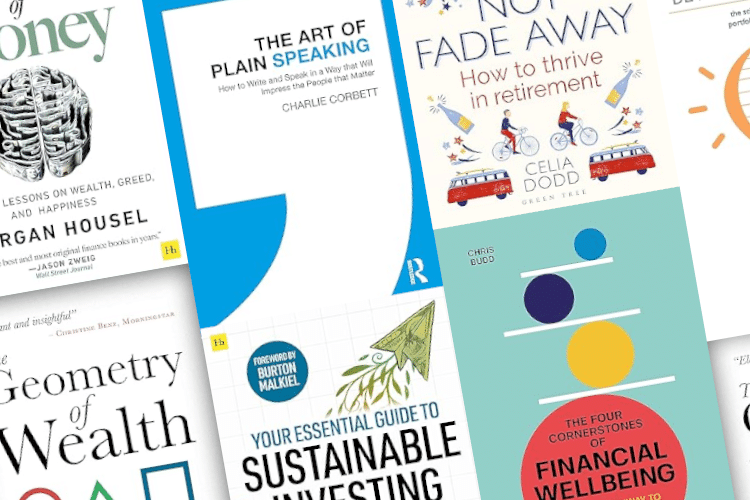By Dan Atkinson
“Personal finance is more personal than it is finance” this quote from Tim Maurer is an important truth for anyone considering a career in financial planning. To be successful you need to be able to interpret and translate money into something which touches clients lives. Something which empowers a life well lived, rather than a burden and a worry.
We’ve picked seven books which we think will give you a head start in your career. They have helped many of our financial planners become a better communicator, understand how people make decisions, and become better with people.
1. The art of plain speaking – Charlie Corbett
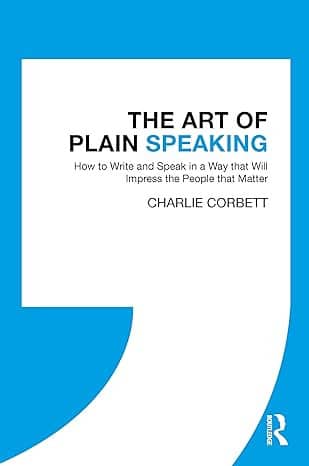
Financial services people often write with an unwritten goal of sounding intelligent. They use long complicated words, phrases, and jargon, pontificating verbosely. This way of speaking confuses the hearer and makes them feel inferior. The opposite of communicating as the message has not got through! Instead of intelligence the speaker projects insincerity. Instead of informing they are ignorant of the person they are inflicting their message on. The only influence they achieve is to be ignored.
If we are working with clients to help them make great decisions about their money we need to be better than this. Who better to help us than a financial journalist and winner of The Plain English Campaign’s Communicator of the Year 2018? This practical book will help you write well, speak well, and avoid bamboozling your clients. Charlie Corbett doesn’t mince his words.”If you want people to pay attention when you write or speak, then avoid this corporate non-speak like you would a rabid dog”.
Buy the book “The art of plain speaking” on Amazon
2. The Psychology of Money – Morgan Housel
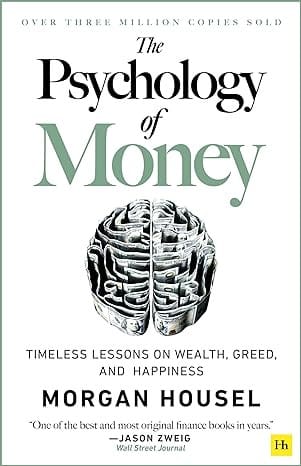
We are far from logical beings. Our money making decisions are coloured by the stories that we carry around with us. As a result our behaviour can easily wander from ‘sensible’, through ‘strange’, all the way to ‘dangerously undermining’. Frequently we confuse money with riches when ‘true wealth’ is about ‘enough’. Indeed at Paradigm Norton, we think that money matters, but life matters more.
Morgan Housel uses real life stories to explore the nature of wealth, happiness, and the ways we make decisions. He gently explains that what we have personally experienced represents a tiny fraction of what’s actually happened. This provides a caring launchpad for an examination of key financial concepts (such as compounding) and our relationship with this thing we call money.
As financial planners we need to remember that just because the way we think about money might be different – no one is crazy. Reading this book will give you an appreciation of the way clients might approach decision making. As a result you will be better equipped to help them put their plan into action.
Buy the book “The Psychology of Money” on Amazon
3. The Four Cornerstones of Financial Wellbeing – Chris Budd
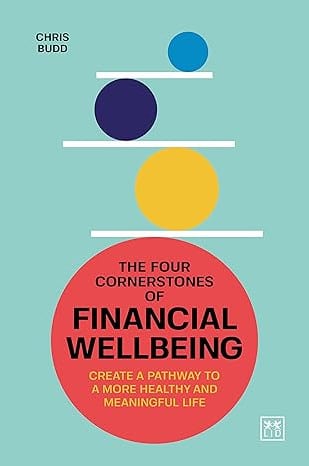
Financial plans contain strategies for helping a client to achieve their goals. For some people there will be a specific goal (or series of goals). At a very high level people want to be happy and live a good life. But what does this really mean? Rather than address the problem head on we often stick a price tag on it and chase after a number. But if we don’t stop to define what it means for us we might be running the wrong race and miss out entirely.
Financial Wellbeing examines this relationship between money and happiness. We think this is essential for helping clients identify, plan for, and live the life they want to live. Paradigm Norton is a corporate member of the Institute for Financial Wellbeing https://instituteforfinancialwellbeing.com/ and many of our team have invested time in studying this area.
Chris Budd’s book examines financial wellbeing in a detailed but accessible way. It will give you insights into the latest research and thinking. Reading this will help you see that great client outcomes are more than numbers on a spreadsheet – money matters but life matters more.
Buy the book “The Four Cornerstones of Financial Wellbeing” on Amazon
4. The Geometry of Wealth – Brian Portnoy
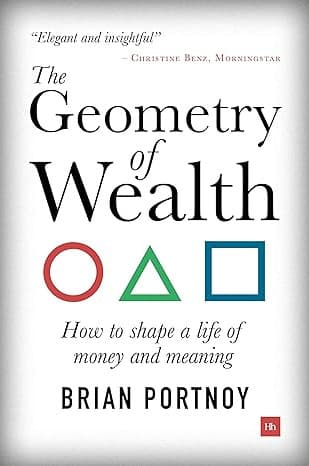
Brain Portnoy sets out to unpack true wealth and how to get it. It’s not about having more, but about achieving ‘funded contentment’. He explains that the Four Cs of funded contentment are Connection, Control, Competence, and Context. Using three shapes (circle, triangle, square), representing three complementary steps to be followed (purpose, priorities, tactics), he helps the reader understand what it is, work out what’s important to them, and gain some investment savvy to work towards it.
When the Paradigm Norton Book Club read it we became better equipped to help clients gain clarity on what they wanted out of life. When we work with clients getting ready for retirement we can use the Four Cs to help them untangle their identity from their time in the workplace. Brian also sets out a simple approach to investing which is used by many financial planning firms including our own.
Buy the book “The Geometry of Wealth” on Amazon
5. Not Fade Away: How to Thrive in Retirement – Celia Dodd
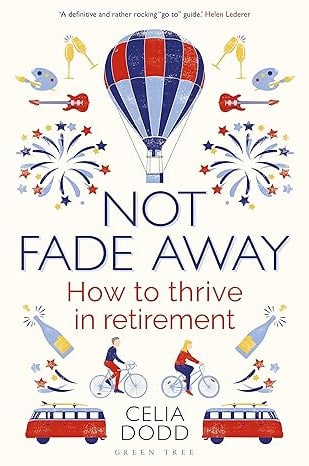
Retirement is something that many financial planning clients are preparing for with eager anticipation. A lot of our work involves helping make sure that money is prepared to fund it. Rather than thinking of it as the finish line at the end of our working lives it’s more like moving on to the next event in a triathlon. So what should people know as they make this transition and change direction?
Having interviewed many retirees Celia Dodd shares their experiences of their ups and downs, successes and challenges. She covers topics not touched upon in financial planning exams such as health, family, relationships, home, and the new found time. Reading this book will help you appreciate real retirement and help your clients plan beyond their portfolio.
Buy the book “Not Fade Away: How to Thrive in Retirement” on Amazon
6. Beyond the 4% rule – Abraham Okusanya

Turning investments into retirement income is bread and butter for financial planners. However unlike some of the decisions we make during our working lives we can’t just save some more if it goes wrong. In October 1994 Bill Bengen set out to put some science around how to try to prevent clients from running out of money. His concept of a safe withdrawal rate is often described as the 4% rule. You may have heard about it in the financial press from time to time.
However since it was published many others (including Bill himself) have developed, refined, and expanded this research. This book examines the research and explores the latest thinking. Abraham Okusanya writes how he talks which helps make this rather technical subject easier to absorb and understand. As a result you will be better equipped to help your clients put their money to work in retirement.
Buy the book “Beyond the 4% rule” on Amazon
7. Your essential guide to sustainable investing – Larry Swedroe and Samuel Adams
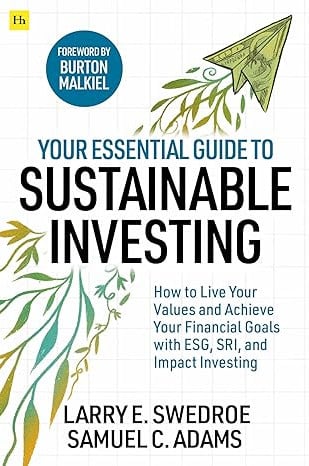
As a Certified B-Corporation we see business through the lens of people, planet, and profit. Often a client’s financial plans are underpinned by investments. There are a wide range of opportunities to connect the way we invest with concern about the way our money affects the wider world.
This book provides some helpful background before diving into an examination of the academic research in this area and providing some pointers on how to put it into practice. As a financial planner you will need to help clients navigate this complex and evolving world. Reading this book will provide you with a solid, evidence based, appreciation for the issues, opportunities, and challenges that sustainable investing brings. Whether you have a personal concern for these issues, or not, it will be just as important to understand as any other aspect of financial planning.
Buy the book “Your essential guide to sustainable investing” on Amazon
Looking for more books to read?
Reading good books is a great way to widen and deepen your knowledge as a financial planning professional. If you’ve plumbed the depths of the books above here are some more from books to consider.
Your Future Self: How to Make Tomorrow Better Today b Hal Hershfield – Link to book
Smarter Investing: Simpler Decisions for Better Results by Tim Hale – Link to book
Psychology of Financial Planning: The Practitioner’s Guide to Money and Behavior by Brad Klontz, Charles Chaffin, and Ted Klontz – Link to book
Nudge: Improving Decisions About Health, Wealth and Happiness by Richard Thaler and Cass Sunstein – Link to book
Financial Planning 3.0: Evolving Our Relationships with Money by Richard Wagner – Link to book
The 7 Habits Of Highly Effective People by Steven Covey – Link to book
Enough?: How Much Money Do You Need For The Rest of Your Life? by Paul Armson – Link to book
The One-Page Financial Plan: A Simple Way To Be Smart About Your Money by Carl Richards – Link to book
The 100-Year Life: Living and Working in an Age of Longevity by Lynda Gratton and Andrew Scott – Link to book
Faster Talk Smarter by Matt Abrahams – Link to book
